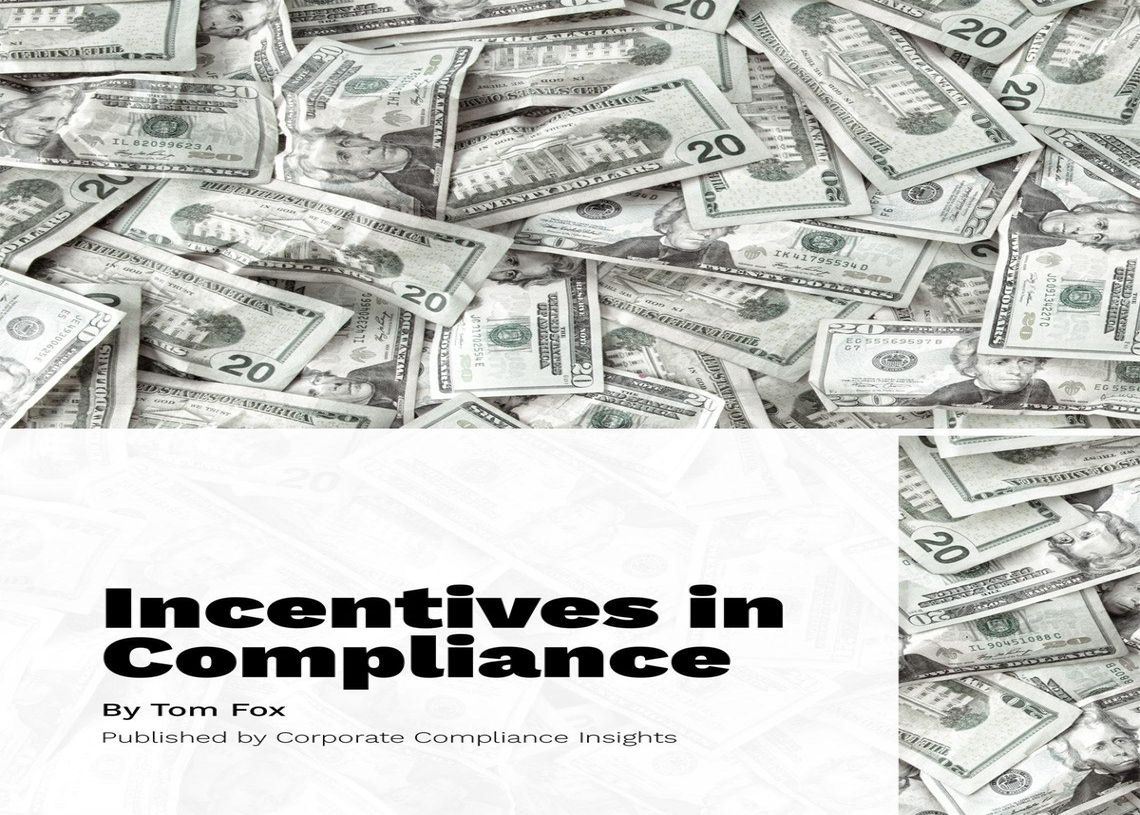In addition to the speeches presented at the ABA’s 38th Annual National Institute on White Collar Crime, by Deputy Attorney General Lisa Monaco (2023 Monaco Speech) and Assistant Attorney General Kenneth A. Polite (Polite Speech); there was the release of the 2023 U.S. Department of Justice Criminal Division Evaluation of Corporate Compliance Programs (ECCP). Today we will begin a multi-part review of this document by considering financial incentives.
This section begins with a new introduction which makes clear the seriousness in which the Department of Justice (DOJ) views incentives, both financial and other types of incentives. The ECCP states, “The design and implementation of compensation schemes play an important role in fostering a compliance culture. Prosecutors may consider whether a company has incentivized compliance by designing compensation systems that defer or escrow certain compensation tied to conduct consistent with company values and policies. Some companies have also enforced contract provisions that permit the company to recoup previously awarded compensation if the recipient of such compensation is found to have engaged in or to be otherwise responsible for corporate wrongdoing. Finally, prosecutors may consider whether provisions for recoupment or reduction of compensation due to compliance violations or misconduct are maintained and enforced in accordance with company policy and applicable laws. Compensation structures that clearly and effectively impose financial penalties for misconduct can deter risky behavior and foster a culture of compliance.”
However, the DOJ reiterated that “providing positive incentives, such as promotions, rewards, and bonuses for improving and developing a compliance program or demonstrating ethical leadership, can drive compliance. Prosecutors should examine whether a company has made working on compliance a means of career advancement, offered opportunities for managers and employees to serve as a compliance “champion”, or made compliance a significant metric for management bonuses. In evaluating whether the compensation and consequence management schemes are indicative of a positive compliance culture.”
Neither of these concepts for incentives are new. Financial incentives were a part of the original 10 Hallmarks of an Effective Compliance Program, as delineated in the 2012 edition of the FCPA Resource Guide. It was brought forward in the 2020 2nd edition. Promotions, rewards and bonuses were also discussed in both of those documents as well as other DOJ pronouncements and formulations over the years. However, this is the first time the DOJ has specifically spelled out the role of the ‘compliance champion’ as both an indicia of a best practices compliance program as well as a mechanism to demonstrate a ‘positive compliance culture.’
The ECCP also added a new section on financial incentives which directs prosecutors to specifically evaluate how a company designs and applies financial incentives. It states:
Incentive System – Has the company considered the implications of its incentives and rewards on compliance? How does the company incentivize compliance and ethical behavior? Have there been specific examples of actions taken (e.g., promotions or awards denied) as a result of compliance and ethicsconsiderations? Who determines the compensation, including bonuses, as well as discipline and promotion of compliance personnel?
Rephrasing these questions, a compliance professional might consider them in the following manner:
- How does the company incentivize compliance and ethical behavior?
- Has the company considered the implications of its incentives and rewards on compliance?
- Who determines the compensation, including bonuses, as well as discipline and promotion of compliance personnel?
- Have there been specific examples of actions taken (g., promotions or awards denied) as a result ofcompliance and ethics considerations?
These four questions basically breakdown into the following continuum: (1) Assessment, (2) Analysis, (3) Implementation; and (4) Monitoring.
Incentive program assessment. Here you need to review your corporate incentive program for all employees, most particularly the discretionary bonus program but also your non-financial incentives such as promotion. Is your bonus program only related to individual sales, division sales or other similar metric or overall company performance? You can begin with some questions suggested by the ECCP: What role does the compliance function have in designing and awarding financial incentives at senior levels of the organization? Has the company evaluated whether commercial targets are achievable if the business operates within a compliant and ethical manner?
If you do not have any component for doing business ethically and in compliance, your entire compliance program is probably falling short at this point. You should also see if this is a query for promotion and not simply does an employee.
Incentive program analysis. Here you need to see what perverse incentives may exist in your organization. Obviously if meeting your target numbers is the sole criteria, your program is once again falling short. On the promotion front, you need to analyze patterns of promotion to (1) see if any employees with ethical or compliance program violations have been promoted; and (2) also determine if employees are promoted simply for NOT have any ethical violations. This would lead to a review of whether or not promoted employees have been actively participated in improving or maintaining a culture of compliance. How does the company incentivize compliance and ethical behavior? What percentage of executive compensation is structured to encourage enduring ethical business objectives?
Incentive program implementation. After implementation of the incentive program, it must be monitored. The ECCP suggests an inquiry into the following area: Has the company considered the impact of its financial rewards and other incentives on compliance? Additionally, what role, if any, did the corporate compliance function have in advising on the bonus program or participating in setting the bonus and promotion structures?
Incentive program monitoring. Here there needs to be ongoing monitoring of the incentive program, including has the company ensured effective management of the incentive program? The ECCP suggests a review of how much compensation has in fact been impacted (either positively or negatively) on account of compliance-related activities?
Join me tomorrow where I take a deep dive into discipline or the new formulation, “consequence management.”






